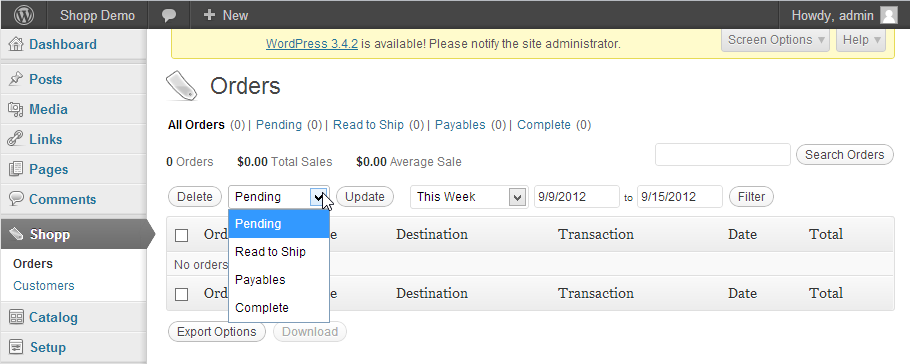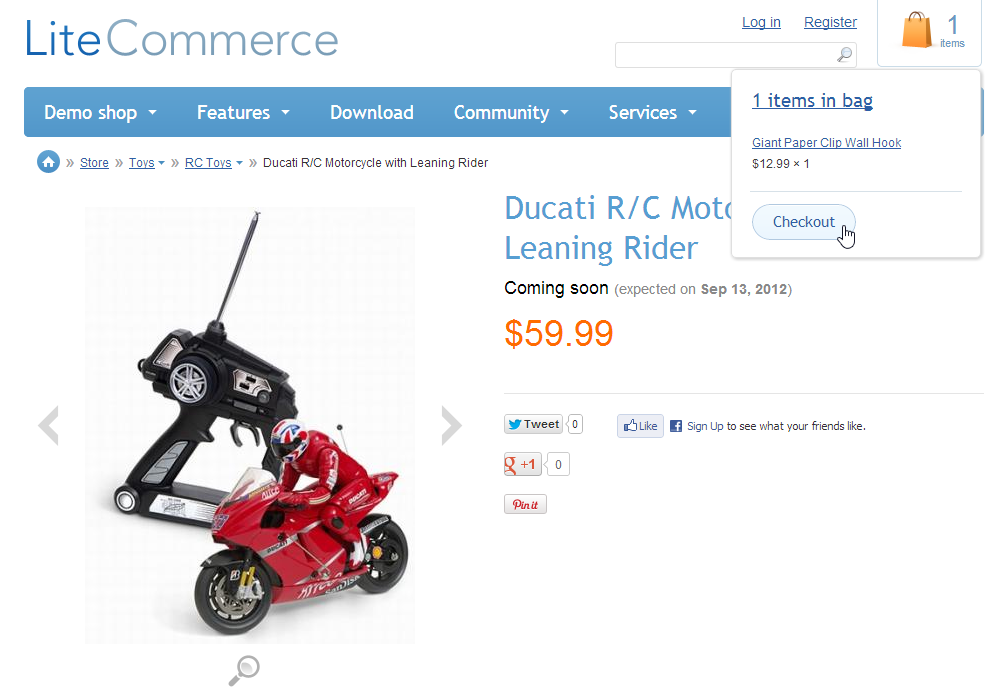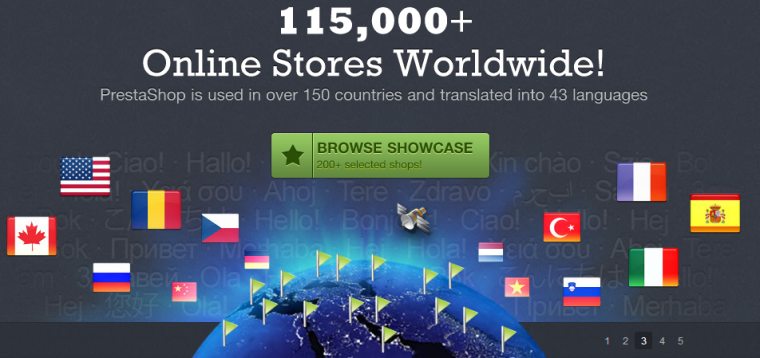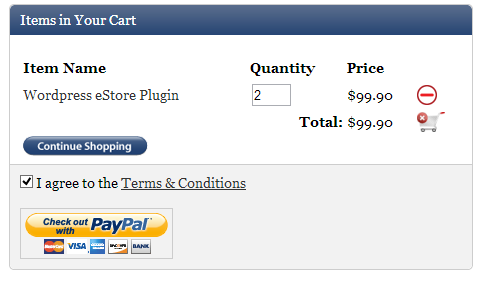A stress-free checkout relies on a user-friendly shopping cart with a cost-efficient payment gateway. Giving your web shop a rock-solid shopping cart, which is both enticing, easy-to-use, and versatile, is one of the best things you can do to improve conversions and maximize sales. The choice is yours–but what a choice this is! There are so many of them at any conceivable price point, that it boggles the mind. Let us introduce you to some of the best shopping carts which truly give each other a run for your money.
1. PrestaShop
PrestaShop (prestashop.com) by Miami-based PrestaShop, Inc., is a stand-alone, open-sourced web shop with a shopping cart on steroids. With its impressive collection of over 275 features, PrestaShop has what it takes for a professional-looking web shop to rise to any occasion. The best thing about it: it is entirely free, that is until you need to extend its functionality.
Add-ons are plentiful, but they tend to be rather expensive. The Amazon Simple Pay add-on will cost you $199.99 (and it’s an introductory price; full price is $279.99). PayPal Pro is also $199.95. MailChimp integration will set you back another $199.99. Themes or templates run anywhere between $54.99 and $124.99. This can quickly add up. On the upside, however, the free features are nothing short of impressive.

The standard, bare-bones, entirely free edition of PrestaShop offers product display features, client and site management, checkout with 16 integrated payment methods (including PayPal, Google Checkout, Authorize.Net and bank wire), shipping cost calculation (integration with USPS, FedEx, UPS, Canada Post), and other features.

Subscriptions require a module. Recurring PayPal payments, split payments, and installments can be set up and managed using Module PayPal Rec ($156.65). You can handle subscriptions with prepayments using Module Subscriptions ($139.99). There is even a Module Advanced auction ($194.51), but these prices can hurt your bottom line even though the core functionality is for free.
2. Shopp for WordPress
Shopp (shopplugin.net/) is a powerful shopping cart plug-in for WordPress with versatile features ranging from cart management, product catalog, and customer accounts management, to integrated fulfillment of digital downloads, SEO, and shipping estimates. Payment gateways supported by the Shopp core include PayPal, 2Checkout, and Google Checkout. Additional payment gateways can be integrated for $25 per module.
You can purchase the core plug-in either for a single site or for an unlimited number of sites. Single-site access is $55. Developer access for unlimited sites will cost you $299, but if you already purchased a license you can upgrade to unlimited site access for $259. With either license, you can use each of your add-ons as many times as you like. Even so, automatic updates will only work for sites with valid and activated keys.

The Shopp core plug-in supports promo codes with discounts as well as shipping and tax estimates. Discounts can be item-specific, per order, or as free shipping.
Shop owners can set up a global tax rate or region-specific tax rates as well as conditional taxes which only apply to specific product categories or customer types, and you can even upload local supplemental taxes. Shopp even sports an optional support for tax-inclusive pricing (which is typical for VAT).
Shopp supports sales of both physical goods (with shipping) and digital downloads (fulfillment as download). With the core Shopp plug-In, digital downloads can be served either from database storage or from file system storage. An optional Amazon S3 module is $25.
Additional payment add-ons support integration with Authorize.net, Cybersource, PayPal Pro, iDeal Mollie (Netherlands), Payson (Sweden), Beanstream (Canada), Manual Processing (for manual terminal payment card processing), and Amazon Payments (for Amazon Flexible Payments Gateway). They are $25 apiece (one license is valid for all of your sites).

System requirements, however, should be taken very seriously. PCI compliance is not automatic, but possible. PayPal checkout or Google Checkout can be integrated as off-site checkout.
The core plugin includes a translation template that can be used to develop new translations for any language.
3. X-Cart
If you need features such as PDF invoices issued upon purchase, X-Cart (x-cart.com) by the Russian company qualiteam might be right for you.
Pricing starts at $159.00 if you are the only person managing sales through your online store. Unlimited seller accounts are supported in X-Cart Pro, which will set you back $491.00.
MailChimp integration is $79. X-PDF invoices costs $49.00. X-Payments, a PA-DSS certified web-based payment application for merchants who want to accept credit cards, starts at $45 per month. (According to the developers of X-Cart, PCI compliance allows you to eliminate the risk of a $50,000 fine from VISA for non-compliance). At this price point, you may as well want to put more time into researching alternatives.
There is a light edition of X-cart by the name of LiteCommerce (see below). The company also offers a shopping cart by the name of ecwid (ecwid.com). Ecwid supports PayPal and Google Wallet, Authorize.Net, among other services, it integrates with any site, supports social media, and is powered by Amazon Web Services. The Basic plan is free, the Silver plan is $17 per month. The checkout is on the service provider’s page.
4. LiteCommerce
LiteCommerce (LiteCommerce.com) is a neat and clean, free shopping cart with sleek AJAX enhancements and a content management system, prepackaged together. In the free edition, LiteCommerce accepts PayPal (using the free Paypal Payments Standard add-on), Authorize.Net (via the free Authorize.Net SIM module), 2checkout.com (using to free add-on 2Checkout.com), moneybrokers.com and QuantumGateway.

Modules are aplenty. Some extensions are free, others have to be paid. The Sales Tax and VAT modules ($0.00 each) enable the calculation of applicable taxes. The User Permissions module ($0.00) allows you to restrict access to backend functions to only those employees who need them. Another free plug-in is Social Login; it enables your customers to sign in with a Facebook or a Google account. A Contact US form as well as Google Analytics integration are also free.
The E-goods module for sales of digital items will cost you $150.
LiteCommerce can work as a Drupal 7 module or a stand-alone shopping cart (PHP 5.3 or newer required).
5. Cashie Commerce
Cashie Commerce (cashiecommerce.com, and no, there is no “r” in “cashie”) is a shopping cart which can integrate with any web site or blog.
The use of Cashie Commerce will cost you 2.5% of your monthly transactions, but only if you sell (and sell in excess of $100 per month, no contracts, no obligations). It supports PayPal and credits cards, and allows your shop to be PCI compliant in that the checkout is processed on the service provider’s site, not yours.
6. WP eStore
WP eStore (WP eStore) is a conversion-oriented shopping cart plug-in for WordPress which allows you to securely sell digital products and services from a WordPress powered site with complete automation.
The entire checkout and fulfillment process works on auto-pilot. The one-time purchase fee of $49.95 includes a lifetime license for unlimited sites (which you must own) and free technical support.
To extend the functionality of your WordPress shop you can purchase additional plug-ins. WP eMember ($49.95) can turn a WordPress site into a membership site. WP PDF Stamper ($49.95 for a single-site license) helps protect your eBooks from piracy by automatically stamping the footer of your PDF files with each customer’s personal details. These plug-ins are also available in bundles.
While you continue mulling this over you can download and install the free and lightweight WordPress Simple Paypal Shopping Cart for a hassle-free checkout with PayPal.
7. Ashop
AShop (ashopsoftware.com) by the Swedish AShop Software comes in two editions: AShop GPL (free, donation-ware) and AShop V ($279). AShop V includes all the features of AShop GPL plus Sales Office and Shopping Mall.
8. Eventbrite
Eventbrite (eventbrite.com) is a web shop for ticket sales to events you create, from parties, concerts and other performances through sports races to trainings and conferences. Fees aren’t cheap, though. Eventbrite gets paid 2.5% of the ticket price plus $0.99 per ticket sold (no more than $9.95). On top of that, your payment processor gets a cut, too. Even so, Eventbrite takes the hassle of managing participation pretty much out of event planning.
And then there is e-junkie.
8. e-junkie
e-junkie (e-junkie.com) can furnish your website or blog with buy now buttons and a shopping cart to let you sell both downloads and tangible goods using PayPal Payments Standard, PayPal Payments Advanced, PayPal Payments Pro, PayPal Payflow Pro, Google Checkout, Authorize.Net, TrialPay, ClickBank and 2CheckOut.

Fees are due monthly and depend on the number of products you sell and (with digital products) on the storage space you wish to reserve. 10 products with 50 MB storage space will cost you $5 (paid each month through your PayPal account). You can change your plan any time. All plan levels support UNLIMITED paid sales; however, the number of Free Checkouts (orders for a $0.00 cart total) per day is limited according to your plan level.
E-Junkie is hassle-free and versatile. Unfortunately, as of this writing, e-junkie does not support recurring payments such as subscriptions. E-junkie recommends you use PayPal Recurring Payments with PayPal’s own Subscription buttons in a E-junkie with PayPal setup. You may wish to combine that with a purpose-built membership management system such as FrontDeskApp, CheddarGetter, MemberWing, etc. If you set up IPN manually in your PayPal account settings for any recurring payments solution, E-junkie’s buttons will override those IPN settings for orders placed through E-junkie without affecting IPN for Recurring Payments.
A similar pricing offers Digital Content Center (digitalcontentcenter.com).
9. Storesprite
An interesting shopping cart solution offers Lamp Design Limited by the name of storesprite (storesprite.com). It is indeed a feature-packed shopping cart which makes a solid impression. However, it is also choke full of annoyances unless you order a commercial edition. Fully featured branding will cost you £99 (or about $160). Each license key will work only on a single domain or store; keys are non-transferable so should you change your mind you’ll need a new key (did we say they were a British company?). The Store Front sports W3 Valid XHTML/CSS. HTML 5 is not supported, a feature which is surprisingly hard to come by among shopping carts for some an unexplained reason. A special highlight: MailChimp export is free. Unfortunately, supported payment gateways, with the exception of PayPal, are rather exotic. Not even Google Checkout or Amazon Payments are on the menu. Modules are non-existent.
10. Mal’s
Another promising shopping cart solution is Mal’s (mals-e.com), but unfortunately it is a hosted service. The basic plan is free. The Premium service is a moderate $8 per month, which buys you no badge (the free version sports a logo in page signature), a restricted admin account, advanced shipping options and more. Mal’s E-commerce has registered with Visa and Mastercard as a PCI compliant level 2 service provider, which you can’t verify as level 2 service providers are no longer listed. Mal’s offers you your own McAfee PCI Certification subscription for free by McAfee ScanAlert right here. Supported payment gateways include Amazon Payments.
11. OFBiz
The Apache Software Foundation, famed for the Apache web server, has its own pet e-commerce project in Apache OFBiz (ofbiz.apache.org, makes you wonder how they came up with that name). Apache OFBiz offers freedom from vendor lock and may appeal to the technically minded. For starters, you have to build it yourself, meaning “build” as in “compile”.
12. Spree
Spree (spreecommerce.com) stands out from the crowd as the only major shopping cart based on Ruby. It is also both open source and free for commercial use. Saying it makes an awesome impression would be an understatement. It is also remarkably the only shop with HTML 5 mojo straight out of the box. Prepackaged it works with only two payment gateways (BankCardServices and Skrill also known as Moneybookers; here is pricing information). Additional gateway support is mostly provided by the Active Merchant plug-in. You can also add your own payment gateways.
13. jCart
Another cart which stands out from the crowd is jCart (conceptlogic.com), a free, bare-bones shopping cart based on jQuery and PHP. There are no bells and whistles, but there are also no strings attached. It’s pretty much what you see is what you get.

14. Zen Cart
Zen Cart (zen-cart.com/) is an online store management system based on PHP-based and MySQL. It branched out from osCommerce back in 2003. In the meantime ZenMagick (zenmagick.org/), which was originally an optional addition to ZenCart, has evolved into a shopping cart system in its own right.
15. Agora Cart
Agora Cart (agoracart.com) by K-Factor Technologies, Inc. from Provo, Utah, is a downloadable shopping cart. The basic edition is free. AgoraCart Gold Version 6.x is a one-time payment of $49.95, lifetime updates will set you back $249. The visuals, however, need a lot of work (makes you hope the invisible code under the hood is more polished).
Other Solutions
Then there is Magento, an open source content management system optimized for e-commerce. Unfortunately, coupons and discounts don’t work in the Community Edition (the only one which is free, the others are priced outrageously unreasonably). Magento has a steep learning curve and painful, nightmarish updates. The documentation is disappointing to say the least and the support is non-existent. Stay away from it.
tomato Cart (tomatocart.com/) by wxjob.com from mainland China branched out from osComemrce as well. It supports just three payment gateways, but what gateways these are! In addition to the ubiquitous PayPal you can use Amazon IPN and Authorize.Net.
There is also opencart (opencart.com, download from Github), a feature rich, open source shopping cart by OpenCart Limited from Hong Kong.
How “free” is free, really?
Joomla aficionados can look into VirtueMart (virtuemart.net) by the British corporation Rochen Ltd., who also offers Joomla hosting.
Google maintains a list of shopping carts for Google Checkout right here. Shopping cart solutions compatible with PayPal are listed here.
Many of these shopping carts are free, or so you are being told. But how “free” is free, really? And how do you find a shopping cart which will make you real money by giving your shoppers the best experience possible?
What else can you do to make your ecommerce site successful?



Leave a Reply